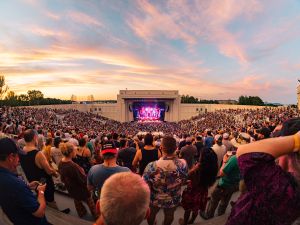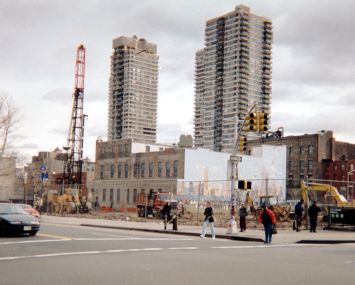When Music Is the Economic Development Engine
Huntsville, Ala., home of the nation’s first municipal music audit and with a ‘music officer’ on the city payroll, aims to use new venues and festivals to up its profile
By Anna Staropoli June 5, 2024 10:30 am
reprints
Come September, Blink-182 and Gwen Stefani will headline the inaugural South Star festival. Mere miles from the festival grounds, the Orion Amphitheater — the brainchild of Mumford & Sons’ Ben Lovett — has already set the stage for superstars, with recent stints from Stevie Nicks, Lana Del Rey and Brandi Carlile.
Each of these artists has performed globally, but the festival grounds and amphitheater in question aren’t in Nashville, Austin or even Birmingham. Rather, Huntsville, Alabama — known as “Rocket City,” thanks to NASA’s Marshall Space Flight Center — is blasting off in music: a key tool for economic and social development.
“I would definitely say we’re swinging above our weight class right now,” said Matt Mandrella, Huntsville’s first-ever music officer (a government position), in reference to the city’s quick successes; the amphitheater has been open for just two years. Huntsville’s goal, however, isn’t to become the next Nashville or Austin, but instead to be included in the same conversations.
So far, the city is doing just that. Billboard this year named the Orion the top East Coast amphitheater, while Rolling Stone highlighted its Colosseum-inspired design. This past spring, members from the Recording Academy — as in the Grammys — paid the city a visit. Meanwhile, that aforementioned South Star festival is in partnership with C3, the team behind Lollapalooza, Austin City Limits and Bonnaroo.
These musical milestones are no accident. Rather, they’re the result of intentional development, spearheaded by the City of Huntsville’s interest in attracting and retaining talent. Over the last decade, Huntsville has announced more than 22,000 new jobs. As Alabama’s largest city by population — Huntsville surpassed Birmingham in 2020, and now has more than 215,000 residents — the city wants to feed growth, said Shane Davis, the city’s director of urban and economic development.
To fill those jobs, Huntsville is prioritizing music as it would any other facet of urban planning, whether parks and recreation or greenways. In 2018, the city underwent America’s first government-funded music audit, to the tune of $140,000, in conjunction with The Sound Diplomacy, a research and strategy consultant. That audit pinpointed and prioritized music development options, addressing community demand and improving Huntsville’s quality of life.
“[Music has] been here for a long time,” said Dennis Madsen, Huntsville’s manager of long-range and urban planning. “We’re starting to really figure out: How do you actually celebrate it?”
That process is more complex than investing in any one venue, but ultimately it intersects with strategic and smart real estate across the city. Huntsville’s music development has materialized through the festival grounds’ park, the Orion amphitheater and adjacent MidCity development, and smaller-scale venues that nurture up-and-coming artists.
Opening riff
Huntsville’s music upheaval has been in progress since 2018’s audit, but efforts are particularly timely. The pandemic left communities hungry for outdoor entertainment and opportunities to connect, while last summer’s Taylor Swift and Beyoncé concerts drove 2023’s economy. Politicians such as Canadian Prime Minister Justin Trudeau pleaded for Swift to visit their countries, blurring the line between music and government responsibility.
For Huntsville, however, music development is less about appealing to tourists (and their dollars) than it is attracting and keeping a local workforce. Consider that roughly 60 percent of Huntsville residents are not originally from Alabama.
To entice employees like Mandrella, Davis, Madsen and even Mayor Tommy Battle — none of whom were born in Huntsville — the city needs to offer activities after 5 p.m. and on weekends, said Mandrella. He believes music efforts warrant the same attention as initiatives to revamp the city’s downtown.
Huntsville, however, has an additional challenge in its reputation. “We don’t hate our state, but we fight our last name,” said Davis, who likened the city to Alabama’s adopted child: a purple city within a red state.
Granted, Huntsville boasts one of the country’s largest research parks in Cummings Research Park and consistently ranks as a top city for engineers. They, alongside architects, comprise 7.7 percent of the city’s local area employment, according to 2022 data from the U.S. Bureau of Labor Statistics. For comparison, the national share is 1.7 percent. The city’s engineers also developed the propulsion units that sent spacecraft to the moon in both the 1960s and recent years.
While Huntsville has always considered itself a smart place, “a smart place only gets you so far in the perception field,” Mayor Battle told Commercial Observer.

Music has the potential to bring those associations back down to earth, so potential employees may equate Huntsville with Josh Groban’s latest tour stop or Neil Young’s upcoming set. “It makes us a destination-type place … and something that makes people curious enough to come and see our community,” Battle said.
And, although Huntsville ultimately wants to attract and keep talent, the city isn’t opposed to the music’s opportunities for tourism. Visitors fly in for a concert or festival, stay in hotels, and engage with the city.
“We want you to visit because we want you to move here,” said Mandrella. “We say: ‘Oh, if you can get somebody in Huntsville for 48 hours, they get it, and they might not want to leave.’ ”
The bridge
A few years ago — after the music audit — the City of Huntsville held a music kickoff meeting at a local brewery. The city expected dozens of people but wound up with a few hundred, not all of whom could fit inside the room to share their thoughts. “I knew then we were onto something,” said Davis. “This community truly wanted this.”
In anticipation of that demand, Huntsville has already prepared the infrastructure necessary for an event like South Star. Huntsville hosted the now-defunct Big Spring Jam until 2011, so planning a festival was not a foreign concept. In fact, the city’s 450-acre John Hunt Park — which will anchor South Star — specifically allocates space for a festival grounds and exceeds Lollapalooza’s 319-acre Grant Park in Chicago.
The sprawling nature of John Hunt Park excited festival organizer C3, said Mandrella, though the city is thinking holistically rather than trying to maximize the space. (The park can fit up to 150,000, said Mandrella, but the festival is limiting attendance to around 30,000.) Huntsville is playing the long game to ensure that the city’s hospitality industry can keep up with festival attendees.
“Whether it’s one person or 35,000 people in that park, you have to deliver that amazing experience in year one to get people to come back and get the word [of] mouth out of it,” said Mandrella. “We know we could fit more people in the park, but we’re gonna cap around what we can do.”
Chord changes
Just a short drive from the festival grounds, MidCity District — a 140-acre, $2.2 billion development that’s currently under construction — occupies the previous site of a 1.1 million-square-foot mall. Huntsville demolished the mall in 2017, making room for the resulting mixed-use district and its crown jewel: the Orion Amphitheater.
In partnership with the City of Huntsville, MidCity developer RCP Companies spent two years planning the district, transforming it from a monolithic mall to a multi-purpose district just beyond downtown. “Because we have multiple assets here between retail and office and residential, this is an 18-hour district,” explained Nadia Niakossary, senior director of development for RCP.
Those various uses created the ideal environment for the Orion Amphitheater, which is at the far end of the property. (The Orion is owned by the city and managed by TVG Hospitality, while RCP owns MidCity.) After all, nothing can ruin a festival more than struggling to leave a venue, said Mandrella. “It changes your whole aspect on whether or not you want to go to that event next year, or tell people about your experience and what your social media posts look like,” he added.
The same goes for concerts, and RCP intentionally filled MidCity with bars, restaurants and other forms of entertainment — there’s a Topgolf already open in the adjacent Apollo Park — that stagger post-concert traffic. Likewise, the amphitheater grounds also host food trucks and local bands on concert nights, encouraging people to come early and stay late. And, although MidCity is not in Huntsville’s city center, it’s near major roads.
“One of the biggest things people say about our amphitheater is ‘I’m finished watching Dave Matthews and I can be on the interstate in 10 minutes,’ ” said Davis.
If concertgoers want to prolong the night with even more music, they can head to the side of MidCity’s parking lot, where a lively, interim concert venue allows visitors to experience MidCity mid-development. Dubbed The Camp, the space consists of little more than food trucks, twinkly lights and a small but effective stage that presents everything from R&B performances to karaoke nights. There are even stints from The Camp’s band, fittingly called The Camp Counselors.
“It’s a place-making project,” explained Niakossary. “We wanted people to come and hang out at MidCity [to] give a feel for what we wanted the overall district to feel, sound, smell like, and let The Camp lead into the larger district.”
Joining the chorus
But it takes more than an amphitheater and a festival to cultivate a thriving music ecosystem. The 2018 music audit exposed a need for more venues of varying scales of accessibility, said Madsen, Huntsville’s urban planning manager. That way, local artists have opportunities to perform and advance.
Huntsville is meeting this need through various adaptive use projects that include Stovehouse — a food, retail and leisure space with multiple stages — and Campus 805, an old middle school converted into an event center. The city is also supporting local artists more literally, in the form of tour grants.
And, despite Huntsville’s Southern roots, the city doesn’t breed any one genre. Rather, its musicians range from instrumental to jazz to electronic artists, though country and rock ticket sales tend to do the best.
Then again, with the right infrastructure, the music doesn’t always take center stage. “You have a lot of people that go to shows at Red Rocks that don’t even care about the band there,” said Mandrella, referring to the famed venue snug in the Colorado Rockies. “They just want to say they went to Red Rocks.”
Anna Staropoli can be reached at astaropoli@commercialobserver.com.



